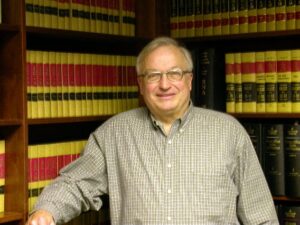One of the central and most dynamic figures of the chiropractic profession’s legal battle for legitimacy, attorney George P. McAndrews, 87, passed away Friday, April 7. McAndrews successfully represented the chiropractic plaintiffs in the historic Wilk v. AMA lawsuit, which exposed a conspiracy by the American Medical Association (AMA) designed to “contain and eliminate” the growth of the chiropractic profession.

The conspiracy, developed by AMA’s “Committee on Quackery,” was carried out over years through several key strategies, including preventing access by chiropractors to research and education funding, prohibiting the inclusion of chiropractic services in hospitals and health plans, and banning MDs from referring patients for treatment to chiropractors or even associating with them on a social level.
After gathering evidence of the conspiracy, four chiropractic plaintiffs, including Chester Wilk, DC, turned to McAndrews for representation. While his background was patent law, McAndrews had a passion for the chiropractic profession that set him apart from others, based in part on the fact that his father, two siblings, one daughter and several other family members were chiropractors. With his strong faith in the merits and rights of his family’s profession, and his talent for communicating complex subjects in an accessible way to judges and juries, he was uniquely qualified to take on the task. Even so, his dedication would be tested over the almost 15 years it took to navigate the case through the courts.
The case was initially lost during a jury trial in 1976. An appeal and a change of strategy led to a bench trial in 1987, during which federal Judge Susan Getzendanner heard the evidence and issued an opinion that the AMA had in fact violated Section 1 of the Sherman Act and had engaged in an unlawful conspiracy in restraint of trade “to contain and eliminate the chiropractic profession.” She issued an injunction order against AMA, permanently enjoining it from restricting the freedom of any AMA member or hospital from associating with chiropractors or chiropractic institutions. The U.S. Court of Appeals in 1990 upheld Getzendanner’s decision, and that same year the U.S. Supreme Court denied three attempts by AMA to have the case heard in the nation’s highest court.
In an address to the American Chiropractic Association (ACA) House of Delegates in 1993, Judge Getzendanner, by then retired from the bench, credited the success of the chiropractic profession to the plaintiffs for their excellent testimony and to attorney McAndrews for his “brilliant presentation of the case” during the arduous trial.
Commenting on the far-reaching impact of the Wilk case, ACA’s long-time attorney Tom Daly noted, “Mr. McAndrews’ contribution to the chiropractic profession cannot be overstated. He single-handedly took on all of organized medicine and the insurance industry to dismantle an insidious system of ethical prohibitions designed to ‘contain and eliminate’ the profession. Much of the progress which is enjoyed today can be directly traced back to landmark rulings of the federal courts in Wilk v. AMA. He was a profoundly good man with a great sense of humor who will be greatly missed by us all.”
In honor of his contributions to the very survival of the chiropractic profession, ACA presented McAndrews with its prestigious Humanitarian of the Year Award in 1998. To ensure that his legacy will be known to generations to come, ACA also established the McAndrews Leadership Lecture in 2015, which honors not only the attorney’s lifetime contributions but also those of his brother, the late Jerome McAndrews, DC. The lecture is presented each year at ACA’s annual meeting.
Chiropractic researcher Greg Kawchuk, DC, gave the McAndrews Leadership Lecture in 2016. In his presentation, Dr. Kawchuk recalled how the story of the Wilk trial unfolded over the years like a “spy novel” and how he and other students would anxiously wait to read the latest developments in the industry’s trade publications. He admitted that the trial “opened my eyes to the realities of chiropractic practice.”
“From that point on,” Dr. Kawchuk said, “legitimizing chiropractic would never be just a matter of educating people about chiropractic or producing more chiropractors; it was also about overcoming overt bias from individuals as well as powerful institutions. The outcome of the trial was profound for me. … It showed that chiropractors could stand up to those who oppress chiropractic and win.”
References
1. Getzendanner S. Permanent Injunction Order Against AMA. JAMA. 1988;259(1):81–82. doi:10.1001/jama.1988.03720010059044
2. Former Judge Getzendanner Tops Program at the ACA Convention. ACA Journal of Chiropractic, Sept. 1993; pp 59-60.
3. Kawchuk, G. The McAndrews Leadership Lecture: February 2016: Putting the “Act” Back in Chiropractic. J of Chiropractic Humanities. 2017; Vol 24, Issue 1: 44-48. https://doi.org/10.1016/j.echu.2017.09.002
